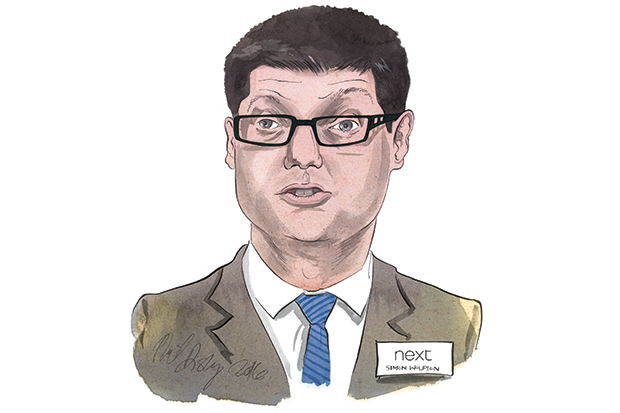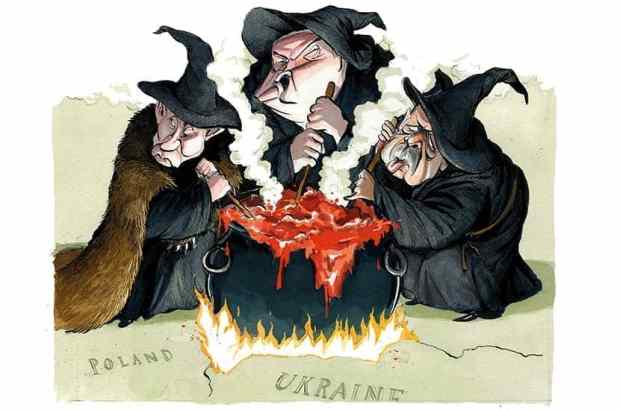It often seems like the European referendum campaign never really ended. Everything from budget forecasts to Britain’s Olympic performance is simply the cue for another round of In-or-Out arguments. But Simon Wolfson, the mild-mannered chief executive of the high street fashion chain Next, is trying to move things on. Having been one of the biggest business names in favour of leaving the European Union, his aim is to form a coalition between Leavers and Remainers to forge a certain type of Brexit.
‘There is a natural alliance between those people who voted Out but who believe in an open, free, tolerant economy and those people who voted to remain.’ Wolfson tells me when I meet him in Next’s London headquarters on the Tottenham Court Road. ‘That natural alliance forms an overwhelming majority of people in the country and it is their ethos and values that should dictate the future.’ This will be the next mission for the thinktank he now chairs, Open Europe.
Set up over a decade ago by Rodney Leach, Open Europe became perhaps the single most influential thinktank on European affairs — often losing its senior staff to cabinet members keen for their advice; the Brexit Secretary’s key policy aide is an alumnus. It is a sign of the strength of Wolfson’s feeling about Brexit that he is taking such a high-profile role in this debate. At times in the interview, he is visibly nervous, with one foot tapping against his other leg. ‘Politics is such a vicious game,’ he says, adding that an interview is ‘actually quite terrifying because one sentence taken out of context could ruin you — literally’.
He’s not entirely unfamiliar with the world of politics: his father, the industrialist David Wolfson, was Margaret Thatcher’s chief of staff for several years. Nor is he new to interviews: he has now been chief executive of Next, a FTSE 100 company, for 15 years, taking the job when he was just 33.
But unlike his father, he has kept his distance from government, professionally at least (he is married to one of George Osborne’s former advisers). But now he feels that there is a specific task: reconciliation.
The Remainers, the theory goes, will share his fear of ‘protectionist measures that stifle trade, stop investment and stop the flow of skills and talent into Britain’. This, he says, worries him ‘more than anything else’. He seeks to campaign for the alternative: ‘an open, free, liberal economy that is enormously successful and far more agile than it would have been within the European Union’.
For Wolfson, the new battleground has three fronts: trade, foreign investment and immigration. On trade, he is bullish. He is confident that Britain can strike deals with the fast-growing Asian economies. After a recent trip to the Far East, he is contemptuous of the idea that Britain is too small a market to interest these countries. ‘We’ve spent 40 years talking ourselves down as a nation and we kind of forget that we are the sixth largest economy in the world. We are enormously important to countries like India and China, and Australia and Canada, both as a customer for their goods but also as a source of investment.’ However, Wolfson warns that ‘absolute reciprocity on certain things isn’t going to be possible’. For example, his view is that ‘we may have to concede some things to Indian investment rules that we’re not happy with’. But, he argues, these kind of deals ‘can still be enormously beneficial to both parties’.
When it comes to reaching a Brexit agreement with the EU, Wolfson accepts that Britain will face an uphill struggle to ‘persuade our European partners that actually it’s also in their interests to come up with a sensible deal because no one wins a trade war’. He stresses that everyone has to realise that ‘tariffs harm both sides’. But the question, of course, is whether the EU will think purely in terms of its economic self-interest, or if it will want to punish Britain for leaving.
Wolfson’s arguments on immigration will prove a harder sell domestically. ‘We need to be very careful, when we talk about the skills that the country needs, not to assume it is all super-scientists,’ he says. He points across Tottenham Court Road: ‘If you go into the sandwich shop over there, you’ll find 90 per cent of the people serving sandwiches aren’t from Britain. If they weren’t here, we wouldn’t be eating our sandwiches.’
But if they weren’t there, might sandwich sellers have to hire British workers? Wolfson doesn’t see immigrants as the easy or cheap option: ‘It is always more expensive and harder to recruit someone from overseas than it is to recruit someone in the UK.’
After just a few weeks at his new post, Wolfson thinks he is making headway. ‘Slowly but surely I think the message is getting through to govern-ment that actually if they are too tough on immigration — in order to appease a relatively small percentage of the population — then the rest of the population is going to suffer.’
He doesn’t think immigration is why people are unhappy with the status quo. ‘The reason why people are frustrated with the economy comes down to one very simple thing: the economy isn’t growing.’ He’s optimistic that Brexit will encourage Theresa May’s government to carry out overdue structural economic reforms.
And how long does he think it will take for the economic fruits of Brexit to mature? ‘If we do the right thing it will probably take four or five years for Britain to show it is thriving outside the European Union,’ he says. He predicts a gentle rise in inflation next year due to the fall of the value of the pound. But his own experience at Next tells him that when suppliers put prices up, retailers ‘work that much harder to find alternative routes to get the same product’.
So he’s optimistic. The question for him, and for Open Europe, is how many Remainers can be persuaded to feel the same way.
The post Europe: the Next step appeared first on The Spectator.
Got something to add? Join the discussion and comment below.
Get 10 issues for just $10
Subscribe to The Spectator Australia today for the next 10 magazine issues, plus full online access, for just $10.
You might disagree with half of it, but you’ll enjoy reading all of it. Try your first month for free, then just $2 a week for the remainder of your first year.















Comments
Don't miss out
Join the conversation with other Spectator Australia readers. Subscribe to leave a comment.
SUBSCRIBEAlready a subscriber? Log in